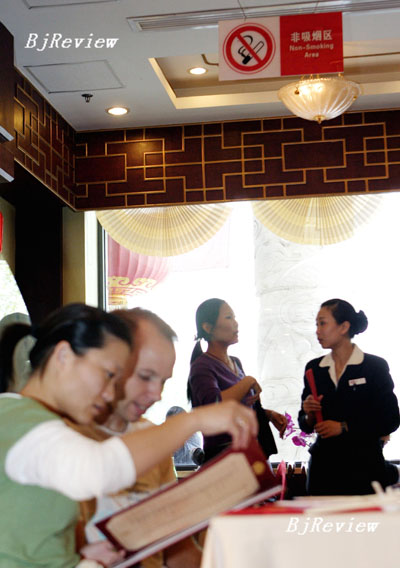|
China's capital will ban smoking in most public places starting from May 1, signaling a big step toward tobacco control in a nation of 350 million smokers and a move to meet China's pledge of a smoke-free Olympics.
Beijing has had some restrictions on smoking since 1996, when the municipal government prohibited smoking in large public venues such as schools, sports venues and movie theaters.
The new rules, which were announced on March 29, expand the scope to include museums, hotels, government offices, holiday resorts and all indoor areas of medical facilities.
Hotels must also have rooms reserved for non-smokers, but the ratio is still being discussed, Cui Xiaobo, a renowned tobacco control expert who helped draft the new rule, said.
Restaurants and Internet cafes will be asked to separate smoking and non-smoking areas from May 1 as part of the new regulation.
"This is only a transitional period, we will eventually ban smoking in all Beijing restaurants," Cui said.
Institutions that fail to comply face immediate fines of up to 5,000 yuan ($713). It has not yet been decided how to deal with individual smokers breaking the new rule. Cui said that stricter regulations will be released soon.
"There are proposals to fine individuals up to 200 yuan ($29)," said Cui. "They won't be fined for now, because some legislators insist the new rule contradicts a previous regulation, which stipulates a fine of 10 yuan ($1.4)," Cui noted.

Were there any difficulties?
The approval copy of the new regulation was posted online to solicit pubic opinions between January 28 and February 12, during which the smoking ban in restaurants immediately stirred concern from the business world.
"For the Chinese, smoking is part of a meal," said Zhao Yingqi, Manager of Jingweilou Restaurant in the city's downtown area. His restaurant has about 20 non-smoking tables compared to the 400 tables sporting glass or steel ashtrays.
Another Beijing-based restaurant owner surnamed Jia said he was worried about the impact of a smoking ban on business. "The rule is very hard to implement, we may lose many customers and endure a big economic loss," he commented.
According to Sarah England, who heads the tobacco control department of the World Health Organization's Beijing office, commercial interests make it hard to ban smoking. China's state-run tobacco industry, which made 388 billion yuan ($55 billion) in 2007, is one huge commercial consideration, she said.
"Originally, we wanted restaurants to keep 70 percent of their areas smoke-free, but owners of Chinese restaurants, both big and small, were worried the plan would hurt their businesses," said Zhang Peili, an official with the municipal government's legislative affairs office who supervised the promulgation of the rule.
"There is a Chinese saying that tobacco and alcohol always come together. This has developed into the Chinese people's habit," she added.
Lawmakers and health experts said the difficulty in introducing a carpet-smoking ban underlines the grave challenges faced in a country with the highest number of smokers.
As a result, the officially released version of the regulation came out to say that restaurants, Internet cafes, public parks and amusement parks are asked to separate smoking and non-smoking areas.

Will it be a step-by-step ban?
"It is difficult for us to control smoking in restaurants, it's just part of the culture," said Jiang Yuan, Deputy Director of the National Tobacco Control Office. "I think it is the right approach to go step by step. It is a brave move to ban smoking in government offices," he added.
"It is obviously not going to be easy to carry out such an act," Cui said, adding that he talked with many restaurant owners before the rule was issued. If all restaurants followed the new law without exception, they would not resist, many owners said.
The regulations are a big step that can only work if people are "self-conscious and abide by the law," added Cui.
Smoking bans in all hotels serving athletes and all competition venues and restaurants in the Olympic Village will be in place by June, according to organizers of the Beijing Olympics.
However, many citizens are taking a cynical attitude toward this rule, saying what they care about most is how long the citywide smoking ban will last and what the actual results will be. They hope that the prohibition act will not just work during the Olympics, but continue after the Games.
"Prohibition action should continue even after the Olympics and more places should get involved in this clean air act," Zhang Ming, a citizen in Beijing said.
What is the majority view on the smoking ban?
The smoking ban has received strong support from non-smoking groups. China Youth Daily, a nationwide newspaper, conducted an online survey in 2007, which concluded that more than 70 percent of respondents supported a smoking ban in public places.
"There was no regulation about not smoking in hotels and offices before, so all we could do was suffer. But now it is different and we can really dissuade smokers," civil servant and non-smoker Tang Jie said. | 